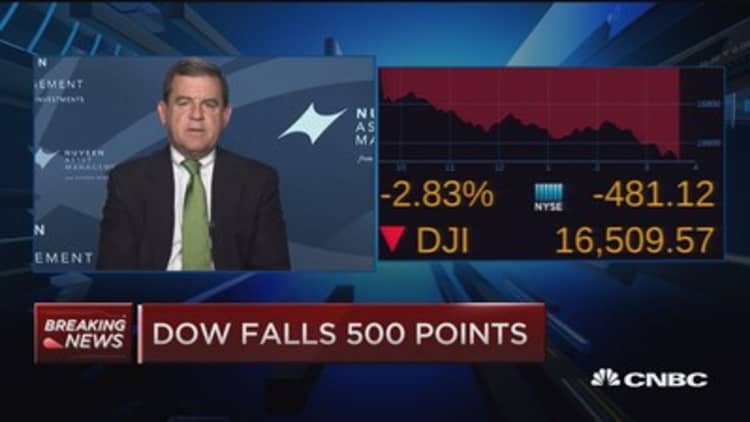
The market is in a bit of a panic mode, with the Dow Jones industrial average plunging 531 points and into correction territory for the first time since 2011, and the correction isn't over yet, noted investor Bob Doll said Friday.
That said, he expects the selloff to eventually become a buying opportunity.
"I think we're rapidly reaching a near-term oversold, from which we'll get a bounce. But I don't believe this corrective period is over yet. Most of the decline is probably behind us from a point standpoint. But I think we have more time to sort this out," the chief equity strategist and senior portfolio manager for Nuveen Asset Management said in an interview with CNBC's "Closing Bell."
Because of that, he's waiting before putting his money to work.
"Corrections in bull markets tend to be sharp, they tend to happen quickly but they don't turn around and go back up on a V-bottom. I just want some time to pass and seek some consolidation," he said.
Read MoreWhat exactly is a market correction?
Doll noted that when momentum stocks get hit, like has now happened, it is usually a sign that the market is reaching at least phase one of the corrective period.
Therefore, he'll be looking to see what stocks begin to hold, go down less on down days and up more on up days.
However, for those who have been waiting on the sidelines to get in on a pullback, he said they should take advantage of the selloff and put a little money in the market.
"We're not heading into a recession. Bull markets don't end of old age or valuation levels. They end when somebody smacks it over the head, and I don't think that's what's happening," he said.
Read More How to play the market selloff: Buy boring
In fact, this is the eighth or ninth selloff of more than 5 percent since the bull market started and every other one has been a buying opportunity, said Doll.
"I suspect this one will follow suit eventually."
—CNBC's Evelyn Cheng contributed to this report.


